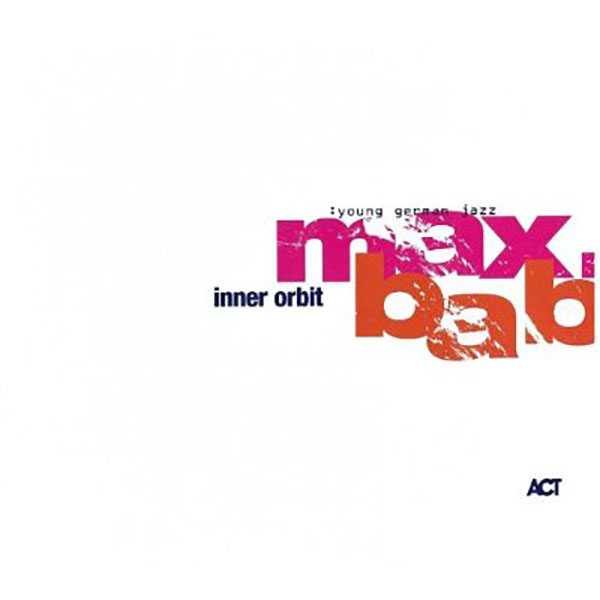
by Ian Mann
August 30, 2009
/ ALBUM
An absorbing and often beautiful record, but one that could do with the occasional injection of pace
This latest release on ACT’s Young German Jazz imprint may not have the same immediate impact as those by iconoclastic trumpeter Matthias Schriefl or piano trio {em}but it is a disc that repays repeated listening.
Max.bab is one of those composite names and the group comprises of Max von Mosch (saxophones), Benedikt Jahnel (piano), Andi Haberl (drums) and Benny Schafer (bass). Incredibly they have been together for ten years and still look incredibly young, but this is their sixth album albeit their first for ACT.
Max.bab’s music is more conventional in feel than much of the other music under the Young German Jazz banner. It also has a strong narrative thread; “Inner Orbit” is loosely a “concept” album taking space as it’s theme but there is nothing self consciously “spacey” about the music, no synthesised bleeps and so on. Instead Max.bab concentrate on the “inner orbits”, how the astronauts feel when they’re in space and it’s effects on their emotions. Their thoughtful, unhurried music attempts to translate these feelings into sound, often with considerable success.
The album begins with the five part “Leonov’s Space Walk Suite” written to commemorate the Soviet cosmonaut who made the first ever space walk back in 1965. “Overture Part 1” by von Mosch opens with just the composer’s wispy tenor and Jahnel’s lyrical piano. They manage to conjure up an atmosphere of spaciousness without resorting to any of the clichés and Jahnel’s lengthy solo demonstrates the purity of his technique. The rhythm section maintain a comparatively low profile but Haberl’s cymbal touches are particularly effective.
The piece segues into “Overture Part II” also by von Mosch, which continues the mood but which becomes more urgent as Leonov experiences nervousness and tension before his historic moment. Von Mosch’s saxophone becomes more declamatory but the serenity of Jahnel’s solo piano outro suggests that the cosmonaut has conquered his fear.
“Interstellar Exit” is the moment Leonov leaves the capsule and enters space for the first time. Written by von Mosch and based around Jahnel’s insistent piano figure the piece features quietly lyrical tenor from von Mosch, subtly shaded percussion from Haberl and a brief solo passage from Schafer’s deeply resonant bass. Like all the music we’ve heard thus far there is a definite cinematic quality about both the playing and the writing. The music grows in power as Leonov becomes more confident in his strange new environment with von Mosch switching to exultant soprano.
The lengthiest part of the suite “5000 Miles In 12 Minutes” comes from the pen of pianist Jahnel.
It’s a representation of zero gravity beginning with delicate percussion and glacial piano. Breathy tenor adds to the atmosphere before Jahnel takes a pretty, classically informed solo. His gently rippling piano forms the backbone of the piece which also incorporates folk tinged saxophone melodies and another passage for Schafer’s bass. Tension begins to build as Leonov has to return to his craft and is forced to deflate his spacesuit in order to re-enter. The serenity of the earlier part of the piece is replaced by a frantic urgency expressed by von Mosch’s sax. The piece resolves itself quietly as Leonov completes this difficult manoeuvre.
The brief “Echoes Inside” written by von Mosch but played by Jahnel on solo piano expresses Leonov’s relief and gratitude at being back on the ship having successfully completed his historic feat.
The space theme is continued throughout the rest of the album albeit more loosely. Despite the title Jahnel’s “Star City” frequently hints at a kind of rural pastoralism. With it’s eminently tuneful, folk tinged melody it conjures up a different kind of open space and suggests the group may have been listening to Pat Metheny or Jan Garbarek. Even when von Mosch probes deeply the essential tunefulness of the piece is never lost and taken as a whole it’s rather lovely.
The group cover the late, great Esbjorn Svensson’s “From Gagarin’s Point Of View”. I suspect that the piece is included not so much as a tribute to their label mate but because it fits the theme of the album. In any event they make a fair job with von Mosch’s saxophone casting the piece in a new light. Haberl’s spookily atmospheric drum feature is also a dramatic departure from the original and is hugely effective. It doesn’t quite match the EST original but it’s a brave attempt.
Von Mosch’s title track is an abstract ballad that features his pretty, feathery soprano. As John Fordham suggested in his review for The Guardian there is something of Britain’s own Andy Sheppard in von Mosch’s sound, none more so than here. This is not intended as criticism, this is a genuinely beautiful piece of work.
Also from von Mosch, “A Distant Place” continues the mood with the leader now on tenor. Bassist Schafer is given the opportunity to demonstrate his abilities as a soloist alongside von Mosch and pianist Jahnel, who makes a typically sparkling contribution.
Schafer takes the composing credits for the final piece “Quietude” which opens gently with Jahnel’s solo piano. The mood of the piece is expressed in it’s title, it’s a pensive, pretty ballad, almost hymnal, centred around Jahnel’s piano and concludes the album on an elegiac note.
“Inner Orbit” is a brave and interesting album, flawlessly played and produced to ACT’s customarily high technical standards. However by restricting themselves to pretty much a single mood throughout the album the group run the risk of becoming becalmed (perhaps “lost in space” would be better metaphor). Certainly the record could do with more dynamics and variations of mood and pace.
That said there is much here to reward the listener, this is an absorbing and often beautiful record.